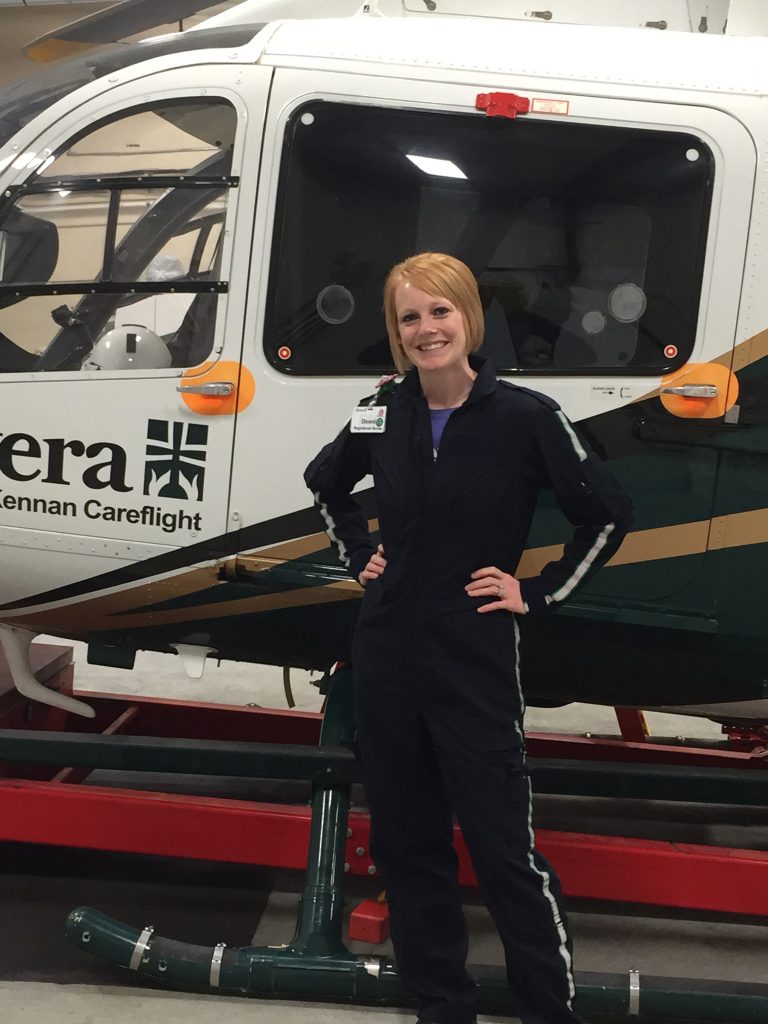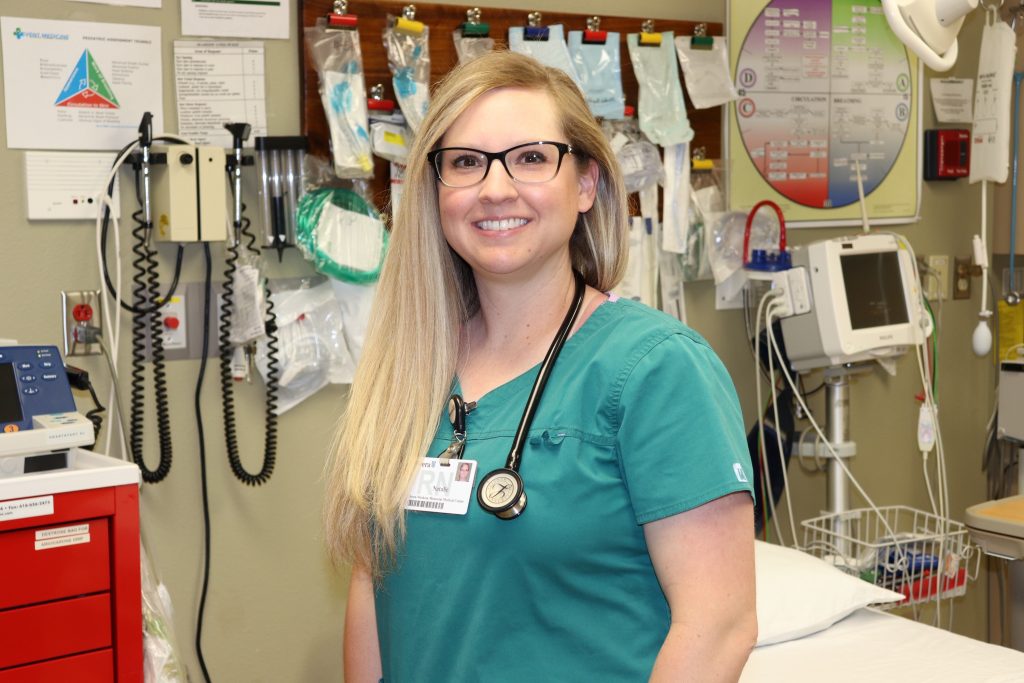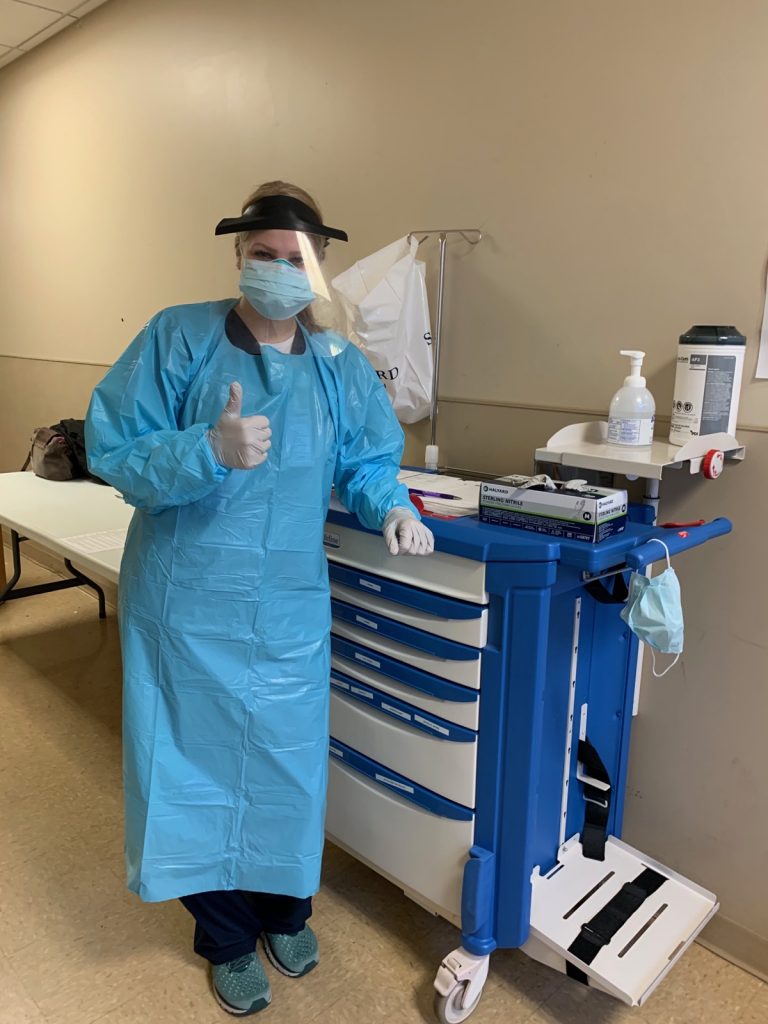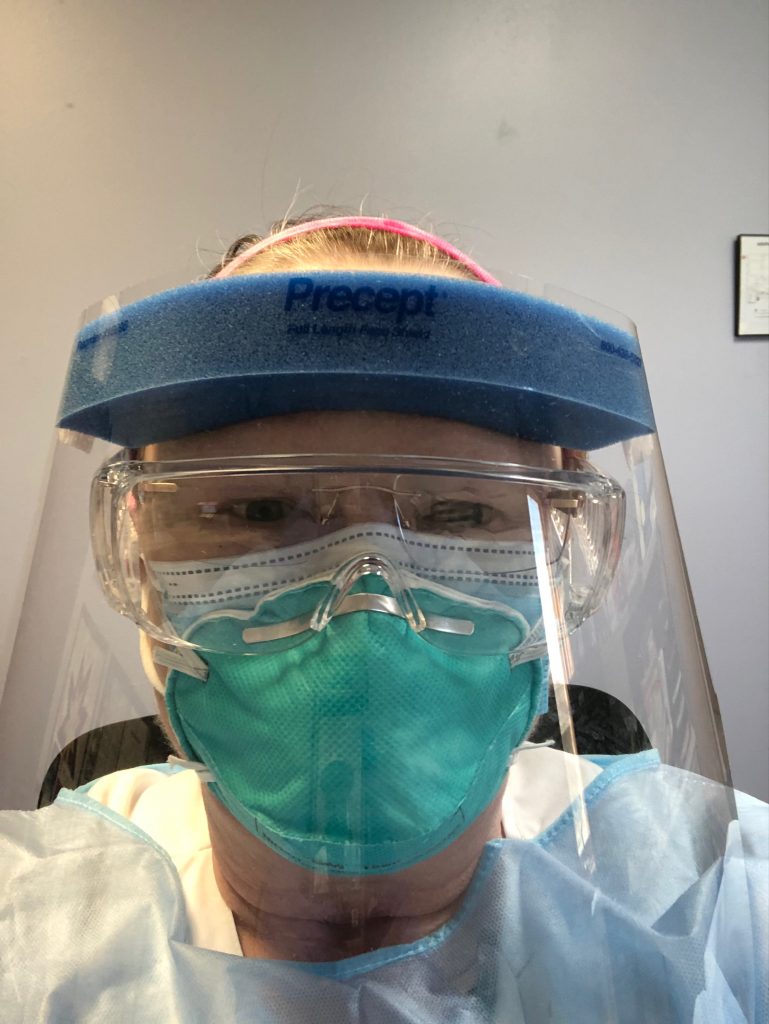What Nurses Connected to Ag Have to Say About COVID
by Lura Roti for SDFU
With more than 6,300 confirmed cases of COVID-19 in South Dakota, there’s a chance you may know someone who has been impacted by the disease. But there’s also a good chance you don’t. So, South Dakota Farmers Union reached out to nurses who not only know rural community members impacted by COVID-19, but they also have some suggestions on how to protect you and those you love from this highly contagious virus.

Donni Van Santen, Sioux Falls
There’s a photo of a flight nurse walking toward the Avera helicopter hanging on the wall where Donni Van Santen and the other members of the flight team prepare to provide emergency care across the state and region via helicopter and airplane.
“It says, ‘I heard the voice of the Lord saying, whom shall I send, who will go for them? I said, here I am Lord, send me,’” shares Van Santen. “If we ever forget why we do what we do, we are quickly reminded. I love being able to help save lives and be the light to brighten someone’s possibly worst day.”
And as the base supervisor in Sioux Falls for Careflight, the registered nurse says she also appreciates the fact that no two flights are the same. “I enjoy the autonomy and variety of flight nursing. On a typical flight, it is myself and a partner. We make decisions together just the two of us.”
Because of the nature of emergency care, Van Santen says once they land, she and her partner typically rush to the patient. “It is in our blood and our nature to rush into the hospital room or scene of an accident because if we are called, things are really bad, and they need our help.” With COVID, they make sure to slow down long enough to put on appropriate protective gear first.
Her fast-paced workdays do differ a bit from the work underway on her family’s Blue Mound Dairy Farm near Luverne, Minn. Also essential workers, her husband, Brad and his brothers are the third generation to operate the dairy. They milk around 1,000 cows three times a day.
What is your advice to farmers like your husband and brothers-in-law? Don’t let your guard down. If you get sick, and you can’t work for two weeks, what does that look like on your farm?
Just because COVID may not be in our community, or you are hearing less about it, does not mean it is any less serious. Wear your mask. Follow CDC guidelines. Practice social distancing and stay home if you are sick.
If wearing a mask or practicing social distancing when you are in a public space is not something you feel comfortable doing for yourself, do it for those your care about – family, neighbors and friends. It is possible to spread COVID and not know you have the virus.
Because of COVID, I cancelled my annual physical. Is it safe to go to the doctor for preventative care? Yes. Special measures have been put into place in hospitals and clinics to protect patients. And although some procedures, like colonoscopies and mammograms were put on hold for a period of time, you can schedule them now.
One more thought. It’s OK to not be OK. Unfortunately, we have seen quite a rise in suicide rates. This is a scary time. If you are struggling with what is going on with the ag economy and additional stress from COVID, there is help. Please reach out to the Farm & Rural Stress Hotline: 1-800-691-4336.

Natalie Bartel, Wessington Springs
When Natalie Bartel first heard about the COVID-19 pandemic in China, her first thoughts were, “I hope it doesn’t get here.”
Unfortunately, it did. To date, there have been 40 cases in Jerauld County. Some have been severe enough to land in the rural, at Avera WesKota Memorial Hospital.
At first Bartel was nervous. However, the hospital protocols and personal protective equipment eased her fears. If a patient is positive, or possibly positive, for COVID, they stay in a negative pressure room so that the virus doesn’t escape into the rest of the hospital. Nurses who care for COVID patients are provided with a special forced-air hood and other protective equipment.
“I think we’re doing an excellent job taking care of our patients in our little hospital, but also we are vigilant about protecting the staff,” she explains.
Patient care is what Bartel appreciates about her work as a nurse in a rural hospital. “I enjoy taking care of the people in my community. I know them and I care about them.”
Nursing is the career Bartel chose because she knew she wanted to live and work in a rural community – and she knew there would always be a need for healthcare workers. She grew up on a farm and married a farmer. Together with her husband, Josh, the couple run a cow/calf herd and grow corn and soybeans. Natalie says nursing is also a career that provides her with the flexibility she needs with three young children and a husband working long, farmer hours.
“I work about five night shifts a month, so it works out pretty well because I can take a nap in the afternoon and on those days Josh can typically get home to take care of the girls when I need to leave for work a little after 6 p.m.”
What’s your advice? It’s important when you are out in the community that you practice social distancing. If everyone would wear a mask, I think that we would see a reduction in the number of cases. I know it’s not the cool thing to do and it’s not convenient. But this isn’t forever. This too shall pass.
If you run errands, keep hand sanitizer in your vehicle so you can clean your hands before you go home.
Washing hands is a really simple thing to do. But it can make all the difference.
What if I’m young and healthy, do I still need to be careful? You need to think about the people you’re coming in contact with. So, it might not just be you. It might be your elderly mom who has heart disease, or even a neighbor’s child that has asthma – COVID could really affect them in detrimental ways, so you have to consider your loved ones too and make sure that you’re protecting them as well as protecting yourself.

Hannah Sumption, Aberdeen
The other day, Hannah Sumption, a licensed practical nurse, was having a conversation with a patient about the pandemic and the patient said, “I am OK if the Lord gives it to me, if that is what happens. In the meantime, he has also given me all the supplies and information I need to take care and not get it.”
Educating patients on how to protect themselves is something Sumption takes seriously – and enjoys.
“Especially now with the pandemic, there is fear, I like to educate people, because fear can take over the mind so quick and cause people to jump to conclusions,” explains Sumption, who works for Sanford Aberdeen Clinic in the Internal Medicine Department. “If people are educated and know about the disease, they will know how to protect themselves. Also, with all the media attention, people don’t know what to believe to make the right decision. As a nurse, patients know the information we give them comes from a credible source.”
Educating others was always part of Sumption’s career plan. She just thought she would do it as an agriculture communicator. “Growing up on my family’s farm, I love agriculture and I want to tell everyone about what we do,” she says of her family’s Frederick crop and livestock operation.
As she began to explore career options her senior year of high school, her sister, Hailey’s career as a nurse, inspired her to look at pursuing a degree in the medical field. She visited Mitchell Technical Institute and met with the nursing instructors. Her decision was solidified when she received a full ride, Build Dakota scholarship. “It really helped my decision that I got my LPN degree paid for and knowing I would always have a stable job. Nurses are always needed in rural areas.”
Sumption was only six months into her first job when the pandemic broke. At first, like many of her patients, she was nervous. “The most nerve-wracking thing about it is what we don’t know about it.”
Today, what she does know about the virus does not inflict fear. It empowers her to protect herself, the patients she serves and the family she loves. In addition to the usual clinic work – checking vitals, assisting with procedures and giving immunizations and other shots, Sumption is also a member of the COVID testing team. As she swabs patients, she wears a disposable gown, glove, mask and face shield.
Even when she is not at work, Sumption is careful. She avoids congested shopping areas, washes her hands frequently and does not touch her cell phone while she is grocery shopping or running other errands.
“I am careful because we are a close-knit family and I am most afraid of giving it to my grandparents, because statistically, they can’t fight it as well as the rest of us can,” Sumption explains. “My advice to my family is, don’t freak out about it. Take precautions and wash your hands.”
What other advice do you have to share? Even when you get together with family, be smart about it. Don’t be hugging on people. Wash your hands. Maybe, don’t use public restrooms. Being in the open air helps. If you can have an outside gathering that is best and keep the numbers down.
What about going to bars and restaurants? I get if you want to go to the local bar because you have not been there in a while. But keep your distance. Wash your hands. I would not recommend bar hopping or drinking too much because alcohol suppresses the immune system.

Mary Jo Nemec, Pierre
As a high school senior, Mary Jo Nemec ran into one of her friends filling out an application to attend Pierre School of Practical Nursing. Because she didn’t have any solid plans after graduation, she decided to follow her friend’s lead.
“Funny thing is, I went and finished, and she ended up not going.”
Although happenstance is how she began her nursing career, Mary Jo Nemec has been very intentional about its progression. Throughout her 40-year career, she has periodically returned to school to pursue advanced nursing degrees. Today, she is a nurse practitioner and works for South Dakota Urban Indian Health.
“I enjoy working with people. I have never been attracted to management positions. I just want to do patient care and work one-on-one with patients.”
Toward the beginning of the outbreak, Nemec actually thinks she contracted the virus, but there was not any testing to confirm. So, she quarantined for a month. “I had a sore throat, but I did not have strep. I had a fever, felt short of breath, fatigue and body aches.”
Now back in the clinic, she says personal protective gear makes her feel safe to interact with patients and continue doing the work she loves.
When she is not with her patients, she continues to wear a mask whenever she is around anyone other than her husband, Nick, who farms near Holabird.
“We got together with our children for Mother’s Day. We ate outside and sat around 6-feet apart with our masks on and visited,” she explains.
What are your recommendations for farm and ranch families? Wear a mask wherever you go. Wash your hands. Be careful where you go. Look around. If someone is walking toward you without a mask, stay away from them as much as possible. And I would not go into a big crowd.
What about getting together with friends and family? Social distancing outside is fairly safe. Wear your mask. Be more than 6 feet apart. And limit your contact with people.

